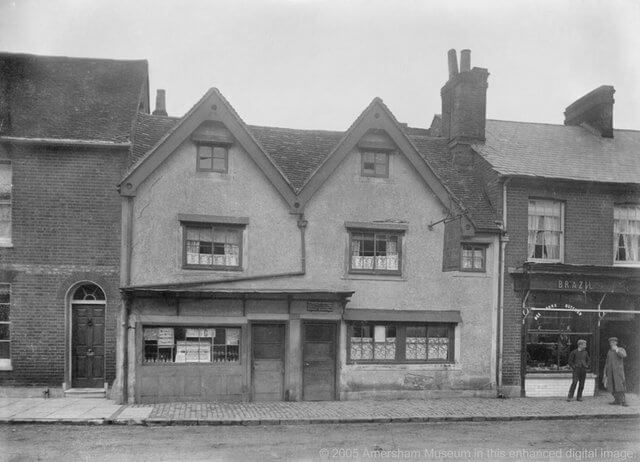This is a talk given by Annie Hamilton-Pike to the Amersham Society in 2001 and is reproduced with her permission. See also the talk given by her uncle, John Brazil, about the Brazils Sausages and Pies business.
Click here to see a talk given by Annie about the Brazils in WW1
It has been a fascinating task in researching my own family for this evening and I am very grateful to my cousins, my brothers, my mother and Jean Archer for the help they have given to me for my research. What struck me immediately, was the incredible number of people we are dealing with. For those that don’t know me, I am the only daughter of Nan Bazzard (née Brazil) who was born and christened Ann, but from a very early age was always called ‘Nan’ – the youngest of 10 children. There were 13 in her parents generation, 10 in her own, 21 in mine and 48 in my son’s. Before you all get up and leave, I do not intend to talk about all 92 relations but merely 10 of them – the Brazils of Amersham (the generation of my mother). I am going to be very brief about my grandparents, not through any discourtesy, but the paucity of time.
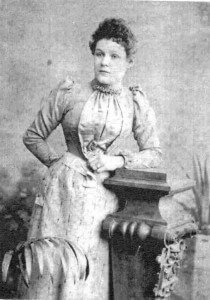
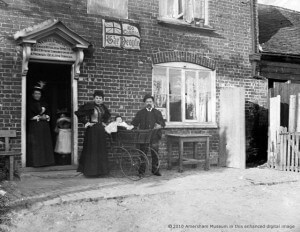
My grandmother, Annie Priest was born in 1875 at the Black Horse public house in Chesham and met my grandfather, George Herbert Brazil, during one of his many cycle rides out from London, where he worked in a butcher’s shop. They married in 1893 when Annie was only 17 – George was 28. They went to live in London but Annie became extremely homesick and presumably wrote and told her parents. So her father one day picked her up in his pony and trap and brought her back home. If George was to continue with the marriage, his choice was either to stay in London or move to Chesham – he of course chose the latter. Coincidentally, on his return there was a shop available in Chesham which he opened as a butcher’s shop but lived at 75 Berkhamsted Road, Chesham where the three eldest children were born – Winifred, George and Sidney.
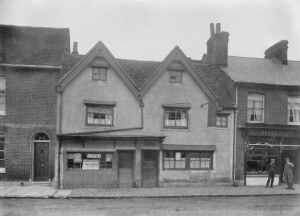
The business flourished and grandfather was anxious to expand so he looked around the area to find another premises. This he did and agreed to rent a shop with living accommodation from Mr Fuller – at what was then 52 High Street, Amersham but is now 95 High Street. It was here at 52 that the story of the Brazils really begins. Looking at birth dates and other background information, it would seem that they moved in the beginning of 1898 where shortly after, their fourth child was born – Doris Annie on the 21st August of that year as were their subsequent six children, Elsie Florence, Ronald, Edward Percy, Jack (who was always called John), Robert (who was always called Robin) and Ann (who was always called Nan) – extremely confusing.
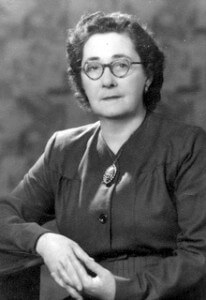 WINIFRED MARY EMILY BRAZIL – 23 June 1894 to 6 July 1983
WINIFRED MARY EMILY BRAZIL – 23 June 1894 to 6 July 1983
Winifred Mary Emily was born in Chesham on 23rd June 1894 and this is her story:- as she was the first born, her parents were anxious that she should have as good an education as they could afford and at the age of 14 they sent her to the Ursuline Convent at Hamont in Belgium for about 2½ years.
At the age of 18, Win went into training a nurse at St Georges Hospital, Hyde Park Corner and on qualification she was sent out to France as a V A D. There, she was in a field hospital looking after the British wounded returning to England in about 1916 when she was 22. In May 1917 she was sent, with a number of other nurses on the troop ship Transylvania bound for Greece and together with other troop ships, they were escorted by several Japanese destroyers. Off the coast of Italy, the troop ship was torpedoed by the Germans and the vessel sank with the loss of several thousand lives. Win managed to reach the safety of a lifeboat together with a number of other women and she particularly remembered an elderly Sister in the boat reciting the Lord’s Prayer and bailing out at the same time. This went on for some six hours and during this whole time, there were troops in the water clinging to the rope which surrounded her lifeboat. One particular soldier was in great distress and in imminent danger of drowning due to exhaustion and exposure. The lifeboat just couldn’t accommodate anymore and so Win decided to swap places with the soldier and lowered herself into the water. He was dragged into the lifeboat by her fellow survivors. After several hours, they were rescued by the Japanese escort boats and taken to Genoa. Thereafter Win returned home over-land. For this act of extreme bravery and courage with no fear for her own life, she was mentioned in dispatches. Her personal record of this was an oak leaf mounted on a bar and ribbon.
Within six weeks she was on her way again to mainland Greece and this time managed to get as far as the Mediterranean but tragically was torpedoed again. It is said that she was picked up by an Italian fishing boat and taken to Italy and eventually made he way somehow overland to Salonika (now called Thessalonika). There, she and her colleagues nursed under canvas for some months in pretty dreadful conditions. Malaria and dysentery were an ever present problem as well of course as the terrible injuries inflicted as a result of this horrendous conflict. Win was attached to the 43rd General Hospital stationed near the Bulgarian border and through a strange set of circumstances, she met up with her brother Sidney but more of that meeting in his story.
Following her discharge from the forces, Win trained as a Norland Nurse and was offered a job working for the Jackson family in British Honduras and whilst there she met one Felix Francis Coldstream Tuckett. Felix was there as an overseer on one of the many banana plantations owned by Elders and Fyffes. He was six years younger than Win and apparently very good looking. They married on the 21st December 1925 when Win was 31 at Quiragua in Guatemala, Central America. They moved into a house on the plantation and when Win became pregnant with her first child, it was decided she would return to England to have the baby as there was no hospital where she lived. She returned to her mother-in-law’s nursing home in Looe in Cornwall and Paul Coldstream was born on 21st November 1927. She stayed with her mother in law for about six weeks and sailed back to Guatemala on one of Fyffes banana boats with apparently the baby swinging in a hammock during the day on the deck of the ship. Some four years later her son Michael was born in Guatemala – they now had a hospital.
Depression hit America which meant that Felix’s job was in some jeopardy, so the family returned to England in 1934. They lived in a flat in Post Office Yard in the High Street and with the backing of her brothers George, Ronald and John (The Brazil Boys), Felix opened a butcher’s shop – where Laura’s dress shop is now (now no.57). This is where their only daughter Biddy was born in 1935.
It seemed that butchering was not for Felix and he decided to return to Central America on his own. During his absence Win and the children were financially supported by The Brazil Boys. Shortly after her youngest sister Nan was married, on 3rd September 1938, Win joined Felix in Central America accompanied only by her two youngest children Michael and Biddy. Paul, also known as Pablo through the Spanish connection of Central America, was 11. The reason he was left behind was that there were no schools in Guatemala for boys of his age. He was left in the care of his paternal grandmother Dandy Tuckett in Looe, which was his place of birth. This, as you can imagine, was an extremely unhappy time for Pablo and he recalls sitting on a seat on the cliffs overlooking Looe with tears pouring down his face. As he looked out to sea, he was imagining his parents, brother and sister on their boat sailing out to Central America without him. On the face of it, it seemed rather hard to leave Pablo behind but it was a decision made with the best of intentions and Win knew that she was going to see him every two years – this being the arrangement that Elders & Fyffes had for their employees for families to return home. However, the Second War broke out and no civilian shipping was allowed across the Atlantic; Pablo did not see his family for the next 11 years.
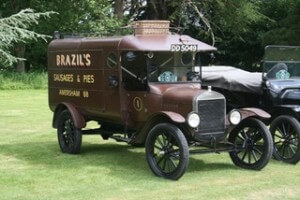
It so happened that in July 1939 my Uncle Robin was holidaying in Looe where he met up with Pablo. He had been there a year and was still incredibly unhappy and he recalls walking along the beach of Looe with tears pouring down his face. There he encountered Uncle Robin sitting on the beach and seeing how upset he was, Robin returned home to Amersham and related the sorry tale to Granny Brazil. She insisted that Pablo came to live with her and the family at 52 High Street and he remained with them for the next 15 years. At the end of the War, Win and Felix and the two children returned to England but Felix did not stay long and returned to Guatemala alone. The reason became apparent subsequently, when Pablo went out to visit his father in July 1949 (which was also part of his training to be a veterinary surgeon). There he discovered that his father was having an affair with a Guatemalan woman called Judy – his secretary at Elders & Fyffes. Win divorced Felix on the grounds of his adultery.
Whilst a small sum of money came to Win from the divorce settlement, it was wholly insufficient to keep her and the children and yet again she was financially supported by The Brazil Boys. Win, along with Elsie, Doris and Nan, were given shares in the now successful company of G Brazil & Co Limited and this gift was sufficient to support Win for the rest of her days, dying at the age of 89 in 1983.
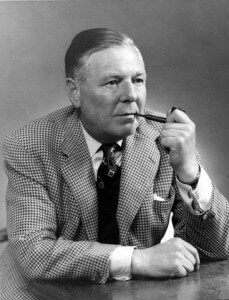 GEORGE PRIEST BRAZIL – 4th September 1895 to 17th March 1960
GEORGE PRIEST BRAZIL – 4th September 1895 to 17th March 1960
My grandparents’ second child was born on the 4th September 1895 in Chesham and he was named George Priest (Priest being his mother’s maiden name). He was the first, but not only child, to be educated at St Mary’s School, Back Lane. After lending a hand in his father’s butcher’s shop in Amersham, he went to work in London for a butcher in Buckingham Palace Road. At the age of 18, he decided to take advantage of the Rothschild Emigration Scheme and emigrated to Toronto, Canada. At the outbreak of The Great War, he joined the Canadian Army but unfortunately it was discovered that he had a heart murmur. He was therefore posted back to England where he spent the war years at the Headquarters of the Canadian Expeditionary Force at Horse Guards Parade, London.
A couple of years after the end of the Great War, George was very undecided what to do and took counsel of his extremely wise mother. It was she who suggested a way forward – “Why not start making sausages?”. This is where the seed of the idea, which turned in to a multi-million pound company began, and fittingly was suggested by the mother of these 10 extraordinary children, but more of that later. My mother tells me he met his wife Ethel Purser (who was always called Sue) when he was on his rounds selling Brazil’s produce in the Windsor area. She was a farmer’s daughter. They married on 5th July 1926 in Slough.
Their first house was at Longfield Drive and George was always very keen to have children to continue the line of Brazil’s. Tragically, that wasn’t to be as Aunt Sue had eight miscarriages. I just can’t imagine how this affected them both. They decided therefore to adopt. While living at Longfield Drive, they adopted Richard. When they moved to Affricks Farm, Little Kingshill, they adopted twins-Ann and Jane. Sadly, Richard died from heart failure and pneumonia in 1971. The family have completely lost touch with Ann and Jane, so little is known about their adult lives.
George was extremely close to his mother and even after having moved out of home and started the factory, he would always call on her pretty well every day for many years. He undoubtedly was the driving force behind the company and all my references to G Brazil & Co Limited in John’s story, equally refer to George.
He had the most beautiful farmhouse in Little Kingshill with a magnificent swimming pool and warmly welcomed all the family there in the summer. He it seems, was the instigator of the family parties which were always held on Boxing Day. It was strictly family only – one year Uncle John took his then girlfriend Ethne Deveraux and George was not best pleased. The family used to play the most childish tricks and jokes and some would dress up in the most ridiculous outfits – Elsie apparently always dressed as a tart!
The Brazil Boys always treated their brother Sidney somewhat as the fall-guy. They used to do terrible things to his clothes, particularly when they had had a drink or two! George would stand in front of Sidney to distract him and John used to go behind him and cut his braces off and inevitable happened. They then proceeded to cut his shirt buttons off and heaven knows what else. He went home a wreck but always took it in incredibly good part. At another party, all the gentlemen were greeted at the door by Uncle George and he proceeded to cut each and everyone’s tie off. He thought that was of course hysterical – not shared by one and all!
I think it’s right to say that whilst George, Ron and John worked extraordinarily hard in the early days, they also played quite hard. George used to fox hunt with John and for a time was chairman of Luton Football Club. He was also a very heavy smoker and that tragically caused his demise. He was nursed, rather fittingly, by his sister Win at home at Affricks until his death from lung cancer on 17th March 1960 aged 64. It’s very sad that I have been able to find out so little about Uncle George, particularly as it was his foresight, imagination and drive that really made G Brazil & Co Limited what it was.
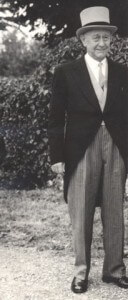 SIDNEY THOMAS BRAZIL – 27th December 1897 to 15th April 1965
SIDNEY THOMAS BRAZIL – 27th December 1897 to 15th April 1965
The last of the children to be born in Chesham was Sidney Thomas on the 27th December 1897. He too was educated at St Mary’s School, Back Lane and left at the age of 14 and went into the Army with the local Regiment at 17. With very little training, he was sent to Northern France as an ordinary soldier in the Infantry where I understand he met a very beautiful French lady who he referred to many years later as simply “Mademoiselle”.
He too went out to Salonika and within a very short space of time became extremely ill with severe dysentery. It was here of course as you have heard earlier, that he met up with his sister Win. She had become friendly with members of a Scottish Women’s Corp who were all doctors. She happened to mention to them how concerned she was about her brother Sid and all she knew was that he was somewhere in the Salonika area. These doctors made enquiries and eventually found out where Sidney was and Win brought him back to her own field hospital by ambulance which not only carried Sidney but a number of dead British soldiers. There Win nursed him to sufficient health where he was invalided out to Malta and then home. In a letter that Win wrote to her father on 13th February 1918 she says – “I had a letter from Sidney yesterday, in which he enclosed a snap of himself and no doubt you have one by now? He looks much better than he did here, so evidently Malta agrees with him, at any rate he seems to be having a good time”.
John picked him up in a pony and trap at Amersham station and he looked a very different person having lost a huge amount of weight. He was dressed in hospital blues. The symptoms of dysentery never left him throughout the rest of his life. After his return home, he became apprentice to a firm of electrical engineers in London and when qualified, he opened a small electrical shop in Great Missenden High Street. It was round about this time he met his wife to be – Doris Evelyn Watts. He moved out of home to lodgings in Great Missenden for two reasons, one home life was a little crowded by now and two, to be nearer to Doris. For some five years he worked pretty solidly and built up sufficient capital that by 1924 he was able to build a garage at Rignall Road Great Missenden (on land he purchased from his brother in law), build a house on land he purchased further down the road, and married Doris Evelyn Watts on 2nd June 1924. Quite an achievement for three momentous happenings in the same year!
Doris became pregnant and after three days in labour gave birth to their first child who was named Evelyn after her mother. Tragically she only survived for five days and Sidney and Doris were devastated. It was just too much for them to attend the funeral at St Peter & St Paul’s Church Great Missenden and the small white coffin of Evelyn was carried by Sidney’s sister, Win. Understandably, the death of Evelyn affected Doris greatly and she really wasn’t very keen to have any more children. Nevertheless, they were delighted when Susan Anne was born on 17th June 1937. Sadly, Doris was not hugely involved in the upbringing and a nanny was employed to help. Inevitably, a huge closeness grew between Sidney and his daughter. Doris continued her pre-marriage work, which was at the War Office in London.
When Susan was about nine, her mother went missing for three days and Sidney was absolutely frantic. At the end of those three long days, a friend of Sidney’s said he’d found Doris in the woods at Dunsmore and went to pick her up in his car. She had attempted suicide by cutting her wrists. She was obviously still greatly troubled by the death of Evelyn but also I understand she was having an affair with a high ranking Army Officer, whom she had met while working in London. This was yet another distressing time for all the family particularly as the incident was fully reported in the local press. Sidney himself was not exactly a paragon of virtue either as there had been one or two dalliances through his marriage. At the outbreak of the Second War, Shiddles (as he was also called) joined the Fire Service at Great Missenden and quickly became their Fire Chief. Being the owner of his own garage, petrol didn’t seem to be a problem to him during the war and he always attended fires in his own car. He had linked up a bell between the fire station in the High Street to his home at “Shercot” and more often than not Sidney was always first at the scene.
His employees at the garage were also volunteer firemen and never ever did he dock their pay when they attended local fires. As volunteers they were paid a very small amount for travelling so effectively they were paid better when there was a fire! Sidney retired from the Fire Service in 1956 at the age of 59 but never retired from his garage until practically the day he died. He had a great interest in gardening and created a large circle of friends around Great Missenden with whom he would take the odd jar in the White Lion in the High Street. His friends perhaps may have abused his generosity at times because at the White Lion he always had a slate and it was not only the cost of his drink which appeared, but many others as well!
It was just after the Second War that financial ruin of his garage nearly beset him. A Mr Huggins, a friend of Shiddles, popped in to the garage to see him and at that particular moment he happened to be in the lavatory. Not finding him in the office, Mr Huggins went into the workshop and unfortunately fell down one of the inspection pits and sustaining quite severe injuries. The accident meant that Mr Huggins couldn’t drive so Shiddles lent him one of his employees without any charge for about a year. Obviously this could not go on for ever and once the “free” chauffer was withdrawn, this man issued proceedings against Shiddles and succeeded in obtaining a judgment for some £3,000 – a huge sum in those days. Susan recalls him coming home from the Court case saying, “I have lost the case and the only way to pay is to sell the garage”. He wasn’t bitter in any way but it would have been quite hard for him to start all over again at the age of 53, but he was quite prepared to do so. However, within three days of this dreadful news, the Brazil Boys offered to pay the figure of damages and the garage survived. From the mid 50’s onwards, S T Brazil Limited undertook all the coachwork for G Brazil & Co Limited and supplied their vehicles thus cementing the very strong family link that continued until Sidney’s death on the 15th April 1965 at the age of 68.
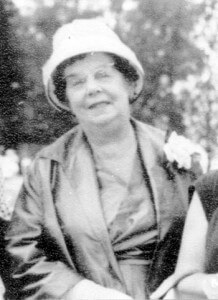 DORIS ANNIE BRAZIL – 23rd August 1898 to 21st November 1970
DORIS ANNIE BRAZIL – 23rd August 1898 to 21st November 1970
My grandparents’ second daughter was Doris Annie born on the 23rd August 1898 only 8 months after Sidney’s birth – she must have been premature. She was the first child to be born at 52 High Street. I always knew her as Doll, as did the rest of the family. Doll worked for two shops in London – Marshall & Snelgrove and Woolens of Knightsbridge. There she learned her trade in high class ladies corsetry and underwear which stood her in good stead, for when she eventually opened her business in Amersham on the Hill. Doris never married but on the 2nd July 1920, when she herself was 21 years old, gave birth to a daughter christened Marie, subsequently known as Molly. Not one of my family were made aware of the father of Doll’s child and Marie’s birth certificate does not reveal this. Her pregnancy was not acknowledged by Granny Brazil, nor it seems the rest of the family. It was certainly obvious to Mrs Bizzell who ran the shop next door to 52 High Street. She broached the subject with Granny that Doll was pregnant but she just could not or would not accept it.
It is said that she returned home from working in London actually in labour and gave birth to her daughter at 52 High Street attended by her elder sister Win. Molly was immediately adopted by a Mrs Rogers at Chesham, (Mrs Rogers was Granny Brazil’s sewing lady). My mother tells me that Mrs Rogers often brought the baby back to see Granny at 52 during those early months. Aunt Doll only ever referred to her illegitimate child as her daughter, in her will.
Aunt Doll remained living at home and shared her mother’s fear of air raids during the Second War. When the air raid siren went she and her mother rushed upstairs to don their siren suits before going into the air raid shelter in the garden at 52. Her brothers Ron and John would often play the most appalling tricks on these two frightened ladies – on one occasion they simulated an air raid attack by rattling the very substantial door to the shelter, thinking that was an air raid, they repaired to the shelter, to much laughter by Ron and John but much to the huge displeasure of Granny and Aunt Doll. Once, when the siren had gone and Granny and Aunt Doll were in the shelter Ron tipped a bucket of coal onto its roof which nearly caused them both to have a heart attack. Very cruel really, but taken in good part. My father sometimes joined in these pranks. Planes were flying over Station Road making a considerable noise and as was usual Aunt Doll and Granny went into the shelter shaking with fear. My dad happened to be sitting beside her and thrust a large pin into her posterior and she went up like a rocket. “You bloody fool Norris, I will kill you”, said Aunt Doll which to an extent defused a very frightening situation.
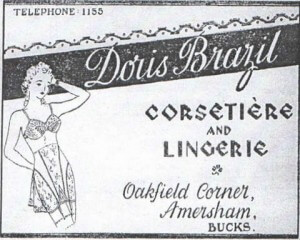 At the end of the 40’s or early 50’s, the Brazil Boys purchased the shop premises in Amersham Road so Aunt Doll could open her own corsetry shop. She ran it successfully herself for many years. She was known as “the corset lady”. Aunt Doll was extremely generous to me and my four brothers and bought each of us our first car – except David. One of the reasons was probably due to the fact that he crashed her Morris 1000 car twice, but the second occasion she wasn’t even aware of. David had borrowed the car for some reason and I think mother had to tell a considerable number of lies as to why it wasn’t being returned on time. It was being repaired at Uncle Shiddles garage in Great Missenden and Aunt Doll just couldn’t understand why it smelt of paint when he eventually brought it back to her. It was ironic in a way that David crashed her car, because Aunt Doll herself was an appalling driver. She only ever used one gear – and that was third. I can hear the scream of the engine now trying desperately to cope with starting off in the one and only gear that she ever used. We used to play tricks on her as children by stuffing a potato up the exhaust of the car with the resultant bang as she was driving down the road.
At the end of the 40’s or early 50’s, the Brazil Boys purchased the shop premises in Amersham Road so Aunt Doll could open her own corsetry shop. She ran it successfully herself for many years. She was known as “the corset lady”. Aunt Doll was extremely generous to me and my four brothers and bought each of us our first car – except David. One of the reasons was probably due to the fact that he crashed her Morris 1000 car twice, but the second occasion she wasn’t even aware of. David had borrowed the car for some reason and I think mother had to tell a considerable number of lies as to why it wasn’t being returned on time. It was being repaired at Uncle Shiddles garage in Great Missenden and Aunt Doll just couldn’t understand why it smelt of paint when he eventually brought it back to her. It was ironic in a way that David crashed her car, because Aunt Doll herself was an appalling driver. She only ever used one gear – and that was third. I can hear the scream of the engine now trying desperately to cope with starting off in the one and only gear that she ever used. We used to play tricks on her as children by stuffing a potato up the exhaust of the car with the resultant bang as she was driving down the road.
She was a great pianist and smoker – both of which she would often do at the same time, particularly at the family parties. She smoked Craven A and Pablo recalls the following: “One classic occasion was that I purloined her packet of Craven A and took the ends out of three or four of them and loaded them with explosive tips and put them back in the packet. In the middle of the party she was strumming away on the piano when the first one exploded all over the piano keys. Silly old Doll, she went on to smoke another one and exactly the same thing happened – Uncle John was rolling on the floor in hysterics. We had to pick him up”. She moved out of 52 High Street with her brothers Ron and John and lived with them at Town Mill until she died.
It was there, that another terrible joke was played on her, this time by her niece Sally Matthews who rang pretending to be the Thames Valley Water Board. Sally disguised her voice with a handkerchief over the receiver and said there was a flood warning and anybody living near the Misbourne should make sure the furniture was taken upstairs to avoid any damage. Pablo and Uncle John were also in on this joke and lowered the sluice gates so that the water overflowed down the steps at the back of Town Mill. Whilst Aunt Doll may not have been initially convinced by the phone call she certainly was when called outside and saw for herself the water pouring down the steps. She rushed about and started to remove furniture upstairs but in the end of course had to be told and in Pablo’s words, “she nearly killed us”.
She was not always a happy person which may be explained a little perhaps because of the birth of her illegitimate daughter. She would see her later in life when she lived at Town Mill (they were very alike physically) but as I have said earlier, Molly was never acknowledged as her daughter except in her Will. Aunt Doll died at Town Mill on 21st November 1970 aged 72 years and myself and four brothers were lucky enough to be some of the beneficiaries of her Will.
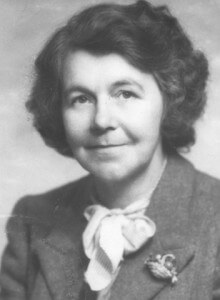 ELSIE FLORENCE BRAZIL – 19th December 1899 to 2nd July 1962
ELSIE FLORENCE BRAZIL – 19th December 1899 to 2nd July 1962
My grandparents’ third daughter was born on the 19th December 1899 at 52 High Street and was named Elsie Florence. She left St Mary’s School, Back Lane at 14 years old and initially worked at Cubitts at Aylesbury who were car manufacturers. She also worked at some point as a swimming instructress at Chesham Moor pool. She met her future husband, Henry George Matthews, through her brother Sidney and they married on 23rd February 1925 at St Mary’s Church here in Amersham. They lived in Chesham Bois in a house called Jandola which was built by her husband George and his brother Bill Matthews using bricks they had manufactured at their brickworks in Bellingdon. Apparently the cost was £250. Elsie was very puzzled why her neighbours were unfriendly and this she found out subsequently; she was born to a trade family as was her husband and the people in the road were very anxious that it should be kept “black coated”, i.e. all professional people. It was ironic that those same people who shunned Elsie’s friendship were quite happy to use the air raid shelter built in the garden of Jandola in early 1938 at Elsie’s invitation, being a reflection of her forgiving character. Her four children were born at Jandola – Teresa, James and the twins Tim and Sally. Tim was born on the 12th June and Sally on the 13th but Elsie had no idea she was carrying twins, which created a lot of panic buying of dual outfits just before they were born.
During the war Elsie was an ARP Warden at Amersham which I gather was mostly women. She used to go off on her rounds during the evening and Sally recalls being terrified at being left at home. I am sure she wasn’t alone but that was her recollection of the events. In 1943 George Matthews bought Dundridge Manor near St Leonards with some 200 acres for £9,000. The Brazil Boys assisted yet again financially and were co-purchasers of Dundridge in equal shares with George Matthews. One of the reasons for the purchase of Dundridge was that the land contained large quantities of clay which was to be used in the manufacture of bricks at George’s brickyard in Bellingdon. However, as the purchase was during the war the brickyard didn’t operate for two reasons – a) because the glow from the kilns would be seen by enemy aircraft and b) no coal was readily available. George Matthews farmed the land.
Elsie was not much involved in the running of the farm as she was busy bringing up the four children but she was a wonderful gardener and she created a superb garden at Dundridge. Her love of gardening has certainly passed on to her daughter Sally. Married life between George and Elsie was not idyllic and was not helped perhaps by the strong family ties as Elsie used to spend a lot of time at 52 High Street with her mother and unmarried brothers. Also it is felt, that George Matthews slightly resented the financial input of Elsie’s brothers and perhaps felt threatened by their influence.
Nevertheless, George Matthews had a very good relationship with Uncle George and from the 50’s onwards, he and his family came up to Dundridge on most Sundays for tea where the two Georges walked round the farm. George Matthews died in July 1957 leaving his share in Dundridge Manor to Elsie and in widowhood, she spent more and more time with her sister Doris who by now was living at Town Mill with John. Auntie Elsie was nicknamed Mrs Match due to her ability to put things together and make them work and further to smooth over any difficulties that occurred within the family.
As I have said, her friendship with Doris became much closer after her husband’s death and pretty well every Friday night during the 50’s Elsie would go down to Town Mill and spend many hours in conversation with John and Doris with any other members of the family who regularly called in. At that time, the Amersham Playhouse was open in Station Road operating as a repertory company. There plays were put on every week and Elsie, Doris and my mother would go every other week after their meeting at The Mill. Doris booked the seats and they were always in exactly the same row at every performance. Doris had an extremely sweet tooth and there was always fudge available to munch during the performances. Unbeknown to her on one occasion, some of the fudge was replaced with an OXO cube. Being absorbed in the play, Doris reached over into the fudge box and took the OXO cube, which was exactly what her sisters had planned! This caused huge hilarity to everyone but Doris!
In 1962 Auntie Elsie suffered a brain haemorrhage, which sadly was not diagnosed properly initially and was taken to St Mary’s Hospital, Paddington, where she died on 2nd July at the age of 62. Her sense of humour never left her and I recall her son Tim telling, me how his mother was urging him to chat up all the pretty nurses who were looking after her in the hospital.
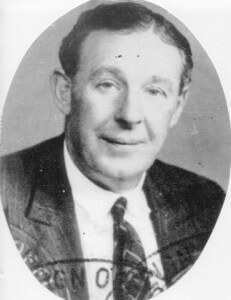 RONALD BRAZIL – 19th August 1901 to 1st September 1950
RONALD BRAZIL – 19th August 1901 to 1st September 1950
Uncle Ronald was born on 19th August 1901 at 52 High Street and we assume, went to school at St Mary’s, Back Lane. I have not been able to establish what he did in his early years but I do know that at the age of about 17 he began working with George and John in the making of sausages in Granny Brazil’s washhouse at the end of the garden at 52 High Street. As I have said before, you will hear much more about the company in Uncle John’s story. Uncle Ron had a huge interest in boats as well as having a very fine baritone voice. He often wished he could have trained as a singer. This was despite a curvature of the spine which created chest problems throughout his life. He bought his first boat the beginning of the war from a boat yard in Marlow and it was named “Poodler”. This was a four-berth cabin cruiser which he kept on the Thames and many happy days were spent motoring on the river. He part exchanged the “Poodler” for his second vessel named “The Call Me Sir”. She was moored at Temple Lock, just above Marlow. Due to the war, it was not used much for boating as Ron was obviously busy at the factory but it was used for another purpose – the storage of food. Rationing was imminent and there was a frantic rush to stockpile food that was likely to be unavailable. This I hasten to add was not illegal but merely showed some foresight by Ron, abetted by John, to buy certain provisions. This included things like sacks of sugar, chocolates, tinned food, condensed milk, baked beans, etc. and these were all kept aboard “The Call Me Sir”. As a result of this stockpiling she went well below the water line at its moorings. Many journeys were made to and from her during the course of the war by John and Ron, ferrying provisions back to 52 High Street.
The evacuation at Dunkirk was as you know in 1940 and the Admiralty were looking for as many boats as possible to help. “The Call Me Sir” was commandeered by the Admiralty and Ron was instructed to sail it down to Teddington for their use. Pablo thought Ron was actually going to sail the craft over to Dunkirk and was in dire risk of losing his Uncle. However his fears were unfounded as “The Call Me Sir” was taken over by a Royal Navy crew, and, we assume, was used to assist in the evacuation. It was offered back to him by the Admiralty but Ron refused as it was in a pretty bad state of repair. The same yard at Marlow offered to sell him another boat (which had been used in the D-Day Landings) – she was called The Annanetta. Ron never married but it appears thoroughly enjoyed the company of ladies, of which there were many. He was also very keen on American cars and certainly in his lifetime owned a Hudson and a Buick.
Pablo remembers him as being the most humanistic of the three Brazil Boys and was very saddened by his early death. Up until this time, Pablo had been supported jointly by Ron and John and on Ron’s death John solely continued his support. He had been admitted to the Royal Bucks Hospital in Aylesbury for a routine appendectomy after which he appeared to be making a good recovery. However after about three days he deteriorated dramatically and died a short while afterwards when it seems he digestive system packed up. He died on 1st September 1950 aged 49 years. He did leave a trust, the beneficiaries of which were his sisters and brothers wherein they derived a small income – again a demonstration of The Brazil Boys concern and support of the family.
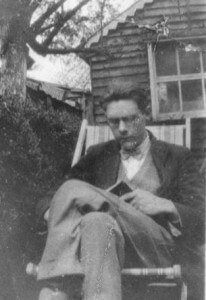 EDWARD PERCY BRAZIL – 22nd June 1903 to 18th May 1933
EDWARD PERCY BRAZIL – 22nd June 1903 to 18th May 1933
Edward was born on 26th June 1903. Confusingly again, he was also known as Ted and Dick. He was in some ways the tragedy of the family – as he was unwell throughout his short life which necessitated full time care. A special building was erected at the end of 52 so Ted could be looked after by Jim Atkins. It seems that he did work as a clerk at some time in his short life but it is not known for whom or where.
Mother remembers in her teenage years that on waking, Ted was practically normal and used to talk extremely fast to enable him to say all that he needed to say before relapsing into almost a coma. She was very reluctant, as a teenager, to push him out in his bath-chair but of course did when he used to say to her, “Come on Nani, take me for a walk”. This she did, and often it was down to Mantles Green Farm where she read him cowboy magazines which he loved.
I imagine the time came when Ted became a little too much for Granny and from the research I have made he was sent to Stone, a village near Ashford in Kent. Contrary to the family’s belief that his illness was started by a tobogganing accident at the bottom of Rectory Hill, that was not the case. His cause of death was encephalitis lethargica. This disease apparently reached epic proportions shortly after the First War and was marked by headache and drowsiness progressing to coma – hence its popular name – sleepy sickness. He died on 18th May 1933 at the age of 29, the other cause of death being broncho-pneumonia. How or why he was sent to Kent is just not known and unfortunately none of the family I have spoken to can remember his funeral. Mother does remember however, that Granny Brazil was extraordinarily upset at his death.
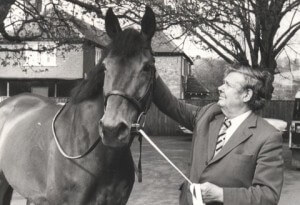 JACK (JOHN) BRAZIL – 15th November 1904 to 22nd November 1979
JACK (JOHN) BRAZIL – 15th November 1904 to 22nd November 1979
Jack Brazil, always known as John, was born at 52 High Street on 15th November 1904. He too went to St Mary’s Back Lane where the headmaster at the time was called Stumpy Garton for obvious reasons. He was a very strict disciplinarian. He left at the age of 13 and when the said Stumpy Garton asked him, “And what do you think you are going to do when you leave school?”, his reply was very firm – “I know one thing – I shall never work for anyone else!”
He helped out in his father’s butchers shop but also had a nice little business of his own. The First World War had of course created a nationwide food shortage, particularly of meat, and some friends of his in London asked him if he could get hold of some chickens. He bought these locally quite cheaply and ferried them by train to London. There were so impressed with the quality of the chickens that word soon got round and he found himself inundated with further orders. By these sales John had made a profit of £15, which he invested in the local branch of the Odd Fellows and Foresters.
As you heard earlier, George, in conversation with his mother suggested that they start making sausages and John was in on that conversation together with his brother Ron. That was probably in about 1918 and the £15 profit he had made from the sale of chickens, was used to start the sausage making process in what was then Granny Brazil’s wash house at the end of the garden at 52 High Street. It is said that the recipes for the sausages and brawn were Granny Brazils and I know that she was a magnificent cook. Grandpa bought meat for the butcher’s shop from Smithfield Market and so he agreed to buy extra meat for the making of the sausages at the same time. The bread, an integral part of the recipe, was bought from Tommy Baker who ran a baker’s shop next door to the Eagle pub. Granny Brazil was banished from the washhouse eventually so that it might be demolished to make room for a bigger building. She was immensely supportive of John’s efforts and never faltered in her faith that her three sons were going to be successful. After about four years, they realised that they were outgrowing the wash-house and looked around for alternative premises. At the foot of Station Road, at its junction with London Road was a field called Wilkins Meadow. They were advised very strongly against its purchase by George Ward Junior the engineering son of the well known local photographer George Ward. He said that Wilkins Meadow was very susceptible to flooding. They did not heed his advice and purchased Wilkins Meadow for £300. There they built their first factory which was completed in about 1925.
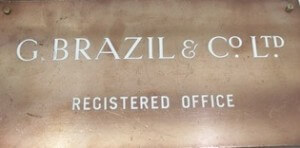 John and his brothers did not take a holiday for many years and all profits were ploughed back into the business so by the early 30’s they were the largest employer in Amersham, having taken on a lot of the men who lost their jobs when Wellers Brewery closed in Church Street. By now they had 10 vans on the road and a six-ton lorry which was used to bring carcases of meat down from Smithfield. Uncle John was always a great lover of horses and together with his brother George began hunting with the Old Berkeley. He recalls buying his first horse from a knackers yard in Maidenhead for the princely sum of £15. He eventually became Master of Foxhounds, a position he held for 24 seasons.
John and his brothers did not take a holiday for many years and all profits were ploughed back into the business so by the early 30’s they were the largest employer in Amersham, having taken on a lot of the men who lost their jobs when Wellers Brewery closed in Church Street. By now they had 10 vans on the road and a six-ton lorry which was used to bring carcases of meat down from Smithfield. Uncle John was always a great lover of horses and together with his brother George began hunting with the Old Berkeley. He recalls buying his first horse from a knackers yard in Maidenhead for the princely sum of £15. He eventually became Master of Foxhounds, a position he held for 24 seasons.
From about the middle of the Second War, Uncle John and his two brothers rented a thousand acres of the Drake’s agricultural land eventually purchasing the freehold in 1958. On the land they reared pigs, particularly at Affricks Farm which of course fed the factory with raw material for their by now very diverse range of products. Uncle John was extremely good I am told with his employees, and started up a social club. The first staff dinner was held in the very first building they had erected many years previously. They also had football and cricket teams and an annual fete that was held at the football ground in School Lane. At that fete, they held a baby competition and various personalities came to do the judging. Two that spring to mind are Moira Shearer the ballet dancer (who lived in the High Street with her husband Ludovic Kennedy) and Anona Wynn a broadcaster on radio. At one of these baby shows there was an extremely peculiar entrant which I shall tell you about in Robin’s story.
Meat rationing was imposed in 1939 which made things very difficult at the factory but they were saved by two war time implementations – the Women’s Institute Rural Pie Scheme and The NAAFI (Navy, Army and Air Force Institutes). G Brazil & Co Limited became the main meat suppliers to the NAAFI and by now they had purchased a similar firm in Witney owned by the Barlett family. They were now producing a whole range of meat products – veal ham and egg pies, steak and kidney pies, Cornish pasties, tinned steak and kidney puddings and pies, hams and vacuum packed bacon.
Uncle John was always very reticent to discuss any of his personal life, preferring to look forward rather than backwards. As you know Jean Archer wrote the story of John Brazil (which was published in 1979) and not once in her many hours of conversation with him did he mention girlfriends. She therefore posed the question about girlfriends and got very short shrift when Uncle John said, “I am not bloody well going to tell you”. I do know however that there were quite a few ladies in his life, but he never quite was able to commit himself to marriage although he was engaged to a lovely girl called Ethne Deveraux. Ethne was also a great friend of my mother, and as you will hear later, was a bridesmaid at my mother’s wedding. She was terribly upset when Uncle John broke off the engagement.
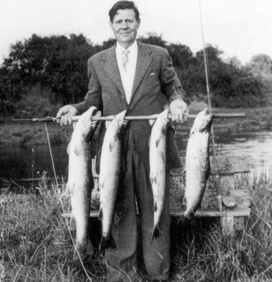 His other interests, apart from hunting, were fishing and shooting. He took over the shoot from the Drake family in 1938 – the year he first rented their land. Shooting was always on a Thursday and at one stage employed three keepers to run the shoot for him. Through his connections with the Field Sports, he met a number of notable people, Lord Balfour, the Queen Mother and Harold Macmillan. I recall the tale of Harold Macmillan shooting at Shardeloes accompanied by his wife, who it is said suffered a nasty shock when a pheasant that Uncle John has shot landed on her head! He met the Queen Mother through his interest in fishing. I do not think that his friendship with the higher echelons of society was entirely money based, although that of course helped, but he did have the extraordinary ability to converse with all and sundry.
His other interests, apart from hunting, were fishing and shooting. He took over the shoot from the Drake family in 1938 – the year he first rented their land. Shooting was always on a Thursday and at one stage employed three keepers to run the shoot for him. Through his connections with the Field Sports, he met a number of notable people, Lord Balfour, the Queen Mother and Harold Macmillan. I recall the tale of Harold Macmillan shooting at Shardeloes accompanied by his wife, who it is said suffered a nasty shock when a pheasant that Uncle John has shot landed on her head! He met the Queen Mother through his interest in fishing. I do not think that his friendship with the higher echelons of society was entirely money based, although that of course helped, but he did have the extraordinary ability to converse with all and sundry.
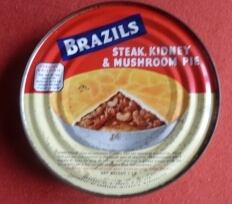 He was also very generous in terms of his time and money and in a conversation with my brother Evan, he was concerned that Shardeloes lake should stay in the family (this was part of his purchase back in 1958 from the Drake family). He said to Evan one day, “How can I stop Mr Wilson taking the lake?” (His reference of course was to what was then known as death duties). Evan replied, “Well Uncle John, you will have to give it to somebody”. “All right, I will give it to you”. This he did and Evan spends many hours on the lake with not only his friends but Uncle John’s as well.
He was also very generous in terms of his time and money and in a conversation with my brother Evan, he was concerned that Shardeloes lake should stay in the family (this was part of his purchase back in 1958 from the Drake family). He said to Evan one day, “How can I stop Mr Wilson taking the lake?” (His reference of course was to what was then known as death duties). Evan replied, “Well Uncle John, you will have to give it to somebody”. “All right, I will give it to you”. This he did and Evan spends many hours on the lake with not only his friends but Uncle John’s as well.
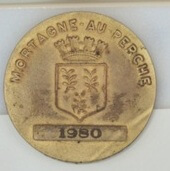
By the late 50’s, the company was making a minimum profit of £200,000 a year, so George and John decided to float the company on the Stock Exchange. Shortly after their decision, George died and therefore plans to float the company were temporarily shelved. About 18 months later the company was floated on the Stock Exchange. Uncle John was conscious that by now no family was involved in the factory. He therefore asked my brother David to join him and after a year working in all departments David became the production manager for the Amersham factory at the age of 19. David recalls that in each 8-hour shift they were manufacturing 40,000 pork pies and 90,000 steak and kidney pies. This was of course as well as all the other products in the Brazil range which was enormous. It was becoming less easy to make a profit, for reasons I am sure David will tell you, and providentially Bowyers of Wiltshire made a bid for the company which was completed in 1970 for some £3 million pounds. Uncle John remained on the Board for a further two years before retiring from the company completely. He was left to pursue his love of the countryside and at that stage he owned about 1200 acres of land.
He also purchased 7,870 acres of moorland up in Westmoreland to further his interest in shooting and spent many happy days up there with his friends, where they stayed in a hotel in Appleby. As you have heard earlier, The Brazil Boys were terrible pranksters and on one occasion when his guests put their shoes outside the bedroom doors for cleaning, Uncle John nailed them all to the floor! He continued to run the shoot each Thursday until he died on 22nd November 1979 aged 74. It was a Thursday.
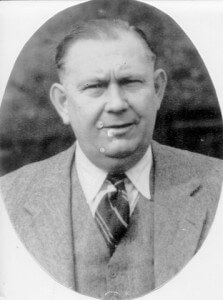 ROBERT (ROBIN) BRAZIL 12th June 1907 to 31st March 1996
ROBERT (ROBIN) BRAZIL 12th June 1907 to 31st March 1996
The youngest boy of the family was born on 12th June 1907 at 52 High Street. Whilst christened Robert he was always called Robin. He too went to St Mary’s, Back Lane and then to Heatherton House. Unbeknown to his teachers, he suffered from severe dyslexia – it is said there was only one story he remembered from school and that was one that he was told. His dyslexia was so bad, he could not read the others.
He was an apprentice carpenter to Rust & Ratcliffe in Chesham at the end of which he was employed for a short time by Jesse Mead Limited, also of Chesham. During his employment with them, he was the foreman on the contract to build the Brazil Boys first factory at Wilkins Meadow. In 1933 Uncle Robin found some land in Stanley Hill called Mortons Wood that he wanted to develop. He had insufficient funds to purchase the land and persuaded Uncle George to financially assist him. Eventually R Brazil & Co Limited was incorporated in 1936 with George Brazil as Chairman, and Ronald, John and Robin Directors. Effectively however, Robin ran the company and thanks to George’s initial input it continued to expand. He first developed all of Stanley Hill and First Avenue working on the site himself during the week and sitting in the showhouse during the weekend. These were marketed in October 1933 for the princely sum of £555. I suppose you could not buy these today for anything less than £200,000.
It was round about this time that he met his future wife – Helen Miriam Stuart Smith. She had been working with Aunt Doll in London which is how they met. Granny Brazil was slightly concerned that her future daughter in law was only working in a shop but Miriam actually was trained as a Froebel Nursery Nurse. At that time she couldn’t get work, hence her temporary employment as a shop assistant. They married in 1935 at St Mary’s Church Amersham, Miriam already being pregnant with their first child, Edward. They had three more children, Priscilla, Henry and Nicholas. Robin and Miriam moved into the showhouse of his development in First Avenue – number 72 Station Road which was actually on the corner of First Avenue. It is thought, although not confirmed, that there were possibly two children born to Robin before his marriage.
As you can imagine, as the war went on there was considerable bomb damage in London and elsewhere and contract building firms were compulsorily grouped together to carry out repair work. R Brazil & Co Limited was grouped with Wrights of Great Missenden and Jesse Mead of Chesham. Not only did they repair bomb damage but completely built a strategic factory for British Celanese at Harefield and an air base at Wing. He served in The Home Guard with the Bucks Battalion based at the factory with his brothers George and Ron, the latter being ranked as Captains and Robin was a C.Q.M.S.
Robin shared a great sense of humour with his brothers which was demonstrated when he entered “a baby” at the annual Brazil’s Fete. He dressed up as a woman, lipstick and all, and “the baby” was a piglet. He actually looked remarkably like Aunt Doll but sadly his entrant finished last. The piglet was kept quiet by the odd injection of a sedative administered by Sally Matthews – terribly politically incorrect and would never be allowed today. Uncle Robin had a life long interest in steam engines and was a founder member of the Chiltern Traction Engine Club. He owned and restored a variety of classic vehicles ranging from a small steamroller to a quite sophisticated Sentinel Steam Wagon. He was certainly a hands-on enthusiast and did an awful lot of the mechanical work himself. However after a near miss accident when a half-ton traction engine wheel nearly fell on him as he worked alone in his workshop, he gave up the practical side but still maintained an active interest in his lifelong hobby.
In 1946 at the age of 39 he and the family moved to Potter Row to a house called Mapleton and stayed there for the next 20 years. He too moved back “home” to Amersham and built a house on the land that he had purchased behind Little Shardeloes and named it Cuckoo Meadow. In common with one or two of his other brothers, there were a number of affairs throughout his marriage and whilst Miriam had turned a blind eye for many years, she was by now somewhat fed up. She divorced him in 1973 when Robin was about 66 and ironically they become good friends after their divorce, which friendship continued until Miriam’s death. At Cuckoo Meadow he spent his final years and took great pride in his garden and was also a wonderful cook and loved to replicate his mother’s recipes. He took a great interest in the Amersham Band and became their President – and the band played at his 80th birthday party at Cuckoo Meadow. Uncle Robin always told the most wonderful stories but “what he didn’t know he made up” but they certainly made far more interesting listening than the truth. Whatever his shortcomings in that regard were certainly made up by his loyalty and friendship to my mother until he died on the 31st March 1996 at the age of 89.
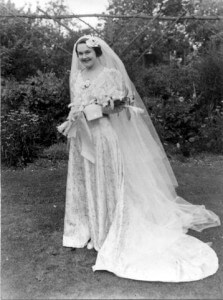 ANN BRAZIL – 2nd August 1913 to 16th July 2002
ANN BRAZIL – 2nd August 1913 to 16th July 2002
Now we come to my Mother – Ann Brazil (always called Nan) who was born at 52 High Street on 2nd August 1913 when her mother was 38 years old. Mum admits to being terribly spoilt by all the family during her youth but particularly by The Brazil Boys. It was not surprising really, as she was the youngest of the ten children. She was the first and only of the 10 children to be educated entirely privately and she attended the Kingsley School at Amersham on the Hill (where St Michael’s Church now stands). She travelled to school by bus which stopped outside 119 High Street (now the offices of my family firm Norris Bazzard & Co) and on most occasions her father used to wave her off wearing his old straw boater and butcher’s apron. As a young girl she found this very embarrassing! From there she went on to Joan of Arc at Rickmansworth. Her education was not the uppermost in her mind and she was very relieved when the time came for her to leave school.
She started working at Brazil’s offices at the age of about 15 or 16. Her task was to check the goods taken out for delivery by her brothers George and Ron to various shops around the area. John remained at the factory, as he was the butcher. George thought she could do much better. Through his contacts, he found her a job at Peat Marwick and Mitchell, chartered accountants, in the City of London at Ironmonger Lane. Mother was now 17 and travelled daily to London by train – it was always the 8.28am. She had a very busy social life and would be absolutely devastated if no date was arranged for a Saturday evening. She went to many local dances in village halls and shared John’s love of horses. In her teenage years she went riding pretty well every weekend using her brother’s horses, which in those days were kept at Wilkins Meadow.
Hunting was also a sport she enjoyed but whilst a proficient rider she was never quite in full control of her mount on the hunting field. John and George nearly always accompanied her. Etiquette dictated that the hunt followers should be behind the Masters and Hounds – which she well knew. However, etiquette flew out of the window on many occasions as she charged through the field, the Masters and the hounds and almost caught the fox before anybody of them! She received a severe telling off from the Master and from John. Her falls were numerous and her brothers became very fed up having to wait for her and yet again she was told off by John who said, on one such occasion said, “Get up you little fool”. On one of these falls she did sustain a nasty gash in her right cheek.
One of her other great pastimes was Health and Beauty – she called it her religion. The classes took place at various venues around Amersham, the British Legion Hall, Whielden Street, The Market Hall here, and after her marriage at various village halls in the area. Throughout the many years she attended Health and Beauty, her teacher was Enid Frost and the pianist a Miss Cotton – she could play anything and without music. The highlight of her early attendances, was a display at the Albert Hall involving thousands of Health and Beauty addicts. Mother was particularly noted for her wonderful deportment.
She also used to do cabarets at local hotels and among the troop was mum’s very old friend, Elsie King. One of their ‘turns’ was danced to the tune of ‘A Hunting We Will Go’. They were all suitably attired with red jackets and whips and part of the routine was to have their arms around each other’s shoulders and dance in a line. Somebody obviously had not considered the varying heights and put Elsie next to mother – she was a good foot shorter. This was a disaster, and mother continually pulled Elsie to the ground, much to the amusement of the audience and Elsie herself.
Mother was a great one for boyfriends, of which there were many. Her brother Ron always made it absolutely plain to her that first, her boyfriends must be introduced to the family and approved of and secondly, they must always pick her up from home – which of course they did. Her first regular boyfriend was Jack Barclay whom she courted for some three years from the age of 19. On numerous occasions he asked for mother’s hand in marriage but was continually refused it. She vividly recalls the day she broke off the romance – she was talking to Jack outside the Post Office in the High Street and said that she just couldn’t continue with the relationship. He was devastated and had no idea what he had done wrong and whilst it was distressing for mother, she was actually quite relieved. She told her mother all about this and she suggested a short holiday in Worthing – just to get away for a bit. Grandpa went as well with mother driving them all in her parent’s Angus Sanderson car, to a hotel in Worthing. One day during the holiday she was parking her car by the beach – and really wasn’t doing a very good job at reversing. A young man in cricket whites saw her difficulties and ran over and guided her into the parking space and promptly asked her out that evening. Mother was not quite sure how her parents would react but the young man said, “Don’t worry because I will of course meet your parents before we go out.” He arranged to pick her up at her hotel at 8pm. 8pm came and went and no sign of this young man. However, mother began chatting to another man and she explained that she had just been stood up. He then asked her out for a drink and she agreed! Off they went in his car to another hotel and it seems that the date didn’t go terribly well as (a) it didn’t last long and (b) she refused to see him again. Her parent’s typical reaction to her being stood up was “We told you so”. Anyway, mother went out for a stroll and speeding down the road was the young man who had stood up. He leapt out of the car and was extremely apologetic saying “I was still batting at eight o’clock and I couldn’t get out on purpose and let the team down”. He met her parents as he had promised before going out for a drink. She found out that he was a solicitor living in South Wales and he was on tour with The Mumbles Cricket Club. They obviously got on extremely well and came the time for mother to go home to Amersham. Neither wanting to be parted, they set about concocting a pack of lies and decided there must of course be ‘something wrong with the car’. They engaged the help of a local garage by persuading them to tell Grandma and Grandpa that the car’s brakes were unsafe and they required two day to put them right. That’s precisely what happened so mum and this young man gained extra time. The young man was of course my father, Wyndham Norris Eifion Bazzard. The relationship continued by post and reciprocal visits were made. After about a year Norris proposed – not for the first time. In mother’s own words she said she was a “silly bitch” for continually turning him down. In the end she was persuaded by his sheer persistence and on the threat of dad going abroad to work, she agreed to marry him.
The wedding was a huge affair at St Mary’s Church here in Amersham on 3rd September 1938. She was attended by no less than six bridesmaids – her nieces Biddy Tuckett, Sally Matthews, Teresa Matthews and Anne Wood, and her two good friends Ethne Deveraux and Phyllis Addicote. Her page boy was her nephew Richard Brazil. The reception was at Affricks Farm, the home of her brother George. After a honeymoon in Devon they returned to live at one of the flats in Post Office Yard and shortly thereafter moved into Town Mill which dad had bought for £1,800 from Fanny Sibley. My brother Charles was the only one of us to be born at Town Mill – on 30th August 1939 after a labour lasting three days. She was attended by Dr Johns and Dr Strang.
Shortly thereafter they moved to Town Farm Cottage, Little Missenden where my other three brothers, Evan, David and Roy and myself were brought up. Town Farm Cottage and Town Farm (some 180 acres) was bought jointly between my father, my Uncle John and Uncle Ron demonstrating yet again their financial assistance to the family. During the Second World War my father farmed the land and thereafter it was let. Dad died in 1960 and after a short sojourn in Lane End, mother returned “home” to Amersham and in 1970 purchased Glebeland House, Rectory Hill. She died on 16th July 2002.
CONCLUSION
Two things have come across to me very strongly as a result of my researches into the family and the first is this; the extraordinary generosity of my three uncles, George, Ron and John and secondly, the extraordinary magnetism of 52 High Street. As to the first, The Brazil Boys were unstinting in their support of their siblings, either in times of adversity or by the backing of their businesses. One must not forget that George, Ron and John built their empire entirely on their own through sheer hard work and graft and their faithless generosity must never be forgotten by the family as I feel sure it won’t be.
When Uncle Shiddles voiced his gratitude for the gift of £3000 to save his business many years ago The Brazil Boys told him, “That’s what families are for”. As to the second, the magnetism was of course my grandmother Annie Brazil. Married at 17, 10 children within the space of 19 years, she was a tower of strength to the entire family. Sadly, she died before I was born so I can only rely on others to describe what that magnetism was. To some, it is felt it was perhaps a little unhealthy that her influence was so absolute but to others it was quite the reverse. She has been described to me as “The matriarch of the family”, “A great diplomat”, “The one who made quiet little remarks about do this, do that in such a manner that no offence could ever be taken”. I think it true to say that she rather eclipsed her husband but let’s not forget that it was his knowledge of the butchering trade which enabled my uncles to succeed, as they did, and that success filtered down throughout the entire family. In conclusion, may I thank the Amersham Society for inviting me to give this talk without whose prompting I would not have found out as much as I have, about the Brazils of Amersham.

